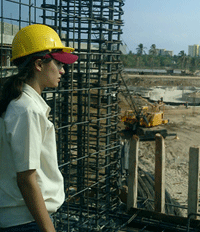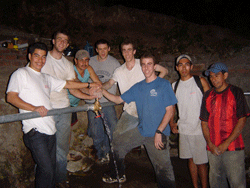![]()
| Using
Technical Spanish as an Intern in Mexico |
 Stephanie Quibb on the job site in Acapulco |
| Not
only was this experience great academically, but it was also wonderful
meeting many people from different cultures. Other interns were from
Canada, Latin America, and Mexico, as well as the US. I established
many friendships that made my experience more enjoyable and met professionals
that could be contacts for the future. We also spent time learning
about Mexico’s history and culture, which has left an unforgettable
impression. This experience will help me in my pursuit of becoming a successful architect. I will be more versatile in understanding practices and styles outside the United States. I strongly recommend practicing abroad to all students; they not only can have a wonderful summer, but they can benefit from the real-world application of their studies. |
|
Engineers Without Borders’ Leaders Use Communication, Engineering Savvy Rice University’s Engineers without Borders (EWB) is one of a hundred fast-growing university chapters. It has four international projects: two in Nicaragua, one in El Salvador, and one in Mexico. These projects must benefit the entire community, be ecologically sustainable, reflect the desires and commitment of the entire community, and apply sound engineering principles.
entire community, the students must find ways to involve everyone in discussions and decision-making. In some developing countries, the culture calls for prominent men to make all the decisions. Students must insist on effective communication processes to ensure that everyone’s needs are expressed and addressed. Entering these cultures, Rice women engineers must communicate
strategically in these projects to gain acceptance as professionals.
In the El Salvador culture,
men felt obligated to take over physical tasks. “It was hard for the women
engineers to keep a shovel in their hands,” said one of the team leaders
on the project headed by Alex Gordon, Ross Gordon, David Kelvin, and Stewart
Walther. This communication issue is significant because the Rice chapter consists
of approximately fifty percent women, and the president for 2006-2007 is a
woman Civil and Environmental Engineering major concentrating on environmental
science
and economics, Deepa Panchang. |
||
| Cain Project Home>>Newsletters |
Spring Newsletter 2006X
|
